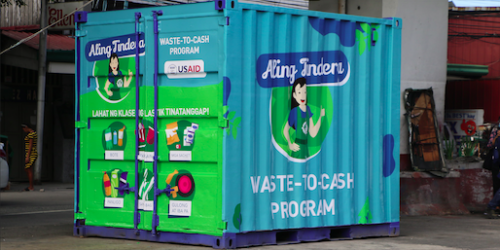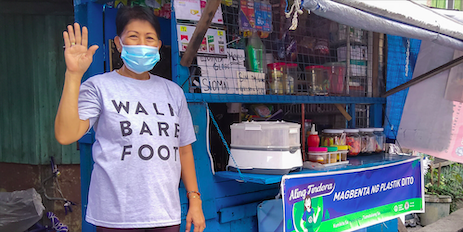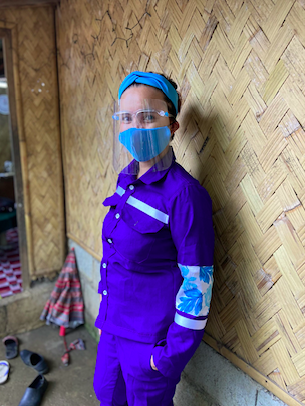Women in the Waste Sector: Unlocking Global Climate Gains through Local Action

Originally posted on Climatelinks.
Around the world, the visible impacts of plastic pollution are steadily growing, seen in mounting landfills, oceans filled with plastic, and once pristine coastlines that are now clogged with waste. How we produce and consume goods, and dispose of the resulting waste also accounts for 45 percent of global greenhouse gas (GHG) emissions, contributing greatly to the climate crisis. And the volume of waste is growing.
In the Philippines, women are leading the way in reducing plastic waste pollution by creating circular economies where waste is used and reused as a resource. This also offsets climate change-fueling emissions.
Lowering Emissions through Hyperlocal, Women-Led Recycling Systems
In Metro Manila, Philippines, women run neighborhood convenience stores, called sari-saris. Sari-sari stores are community mainstays that dot local streets and carry everything from daily food items to household goods. Women store owners earn income, while managing their own time and resources, and make it possible for locals to buy everyday goods in small, affordable quantities. Now, through a new Aling Tindera (waste-to-cash) network, they are securing and creating a market for ubiquitous community plastic waste that also reduces the environmental impacts of plastics, helping to clean up communities, and putting cash back in the pockets of community members.
The Aling Tindera model, developed by the Philippines-based non-profit organization Plastic Credit Exchange (PCX) and supported by USAID, seeks to create local, market-based, and inclusive circular economies, leveraging neighborhood staple sari-sari stores as hubs to monetize and reduce plastic waste. By joining the network, women are expanding their store’s service offerings, economic opportunities, and becoming key players in the recycling supply chain. As Aling Tindera members, women are establishing their stores as community collection points where local waste collectors, junk shop owners, and community members can sell their cleaned plastic in exchange for cash. This exchange generates additional income for both store owners and community members. Collected plastic waste is picked up by PCX and sold back into the manufacturing loop where it is recycled or upcycled into new products. Private sector partners are also engaged in the system, financing the plastic buy-backs through the purchase of “plastic-offset credits,” which function like globally recognized carbon credits––offsetting companies’ plastic production and reducing their environmental footprint.

Credit: PCX for USAID Clean Cities, Blue Ocean
Aling Tindera stations accept various low- and no-value single-use plastics that are rarely collected and otherwise would not have a market value. By putting plastics back into the manufacturing loop, women in the Aling Tindera network, like Ms. Lorme (pictured above), are lowering GHG emissions by reducing the need for new plastic manufacturing and ensuring existing plastic is recycled responsibly. This is critical as, without any action, GHG emissions from plastics production and incineration could amount to 56 gigatons by 2050.This is 10 to 13 percent of the entire remaining carbon budget. In the first six months, four Aling Tindera partners collected nearly 9.2 metric tons of plastic for recycling or reuse—the equivalent to over 360,000 one-liter plastic bottles. Rolled out across cities like Manila, the GHG emissions savings would be staggering.
Improving Island Sustainability and Climate Resiliency through Women’s Essential Work
In another city in the Philippines, Puerto Princesa in Palawan, women waste collectors are working to collect community waste and prevent it from leaking into and damaging vital ecosystems, like mangroves, that help mitigate climate change. Women make up over half of the 15-20 million informal waste collectors that manage daily global waste. In rapidly urbanizing low and middle-income countries, informal women waste collectors are essential to the system of waste collection, supplementing limited or non-existent formal waste services.
In Puerto Princesa, women waste collectors are starting to be recognized as revered “Eco-Warriors,” because of their work to prevent uncollected and mismanaged waste from leaking into the environment. Across the Philippines, an average of 55 percent of waste goes uncollected. The Eco-Warriors’ work to collect waste protects mangroves, which are important sources of carbon sequestration, coastline stability, and are protectors against storm surges.

Credit: Project Zacchaeus for USAID Clean Cities, Blue Ocean
Their work not only helps mitigate the climate crisis, but also reduces other harmful impacts like increased rates of dengue and other vector borne diseases that can result from waste-clogged city drainage systems.
Together, Puerto Princesa’s Eco-Warriors gather over 3,000 pieces of recyclable plastic per week from waste bins and neighborhood streets. In the past, they have done so with limited resources and few tools or safety protections, risking their health as they perform intense physical work. Now, however, USAID, through its grantee Project Zacchaeus, is engaging with and raising awareness of the critical contributions of this women-led sector––as vital to the community and the environment. With USAID support, the Eco-Warriors are engaging in a number of activities that build skills, foster leadership, enable empowerment, and increase safety protections and livelihood opportunities, while improving community waste services for reduced plastic pollution.
About USAID Clean Cities, Blue Ocean
Clean Cities, Blue Ocean is USAID’s flagship program to address ocean plastic pollution. The program aims to strengthen waste management systems in priority urban areas throughout the world. From Southeast Asia to Latin America, the program elevates the vital role of women in urban waste management systems.
Despite their importance in waste collection systems, women are often undervalued and face challenges unmatched by their male peers, with more limited opportunities to generate income and access comparable employment options. In response, Clean Cities, Blue Ocean is working globally to support, empower, and expand opportunities for women in the waste sector and in communities as local agents of change. This work promotes gender equality and builds robust and resilient waste systems that are able to keep pace with growing urban populations while reducing environmental impacts. Together with local organizations, grantees, and women workers themselves, USAID is reimagining urban waste systems and challenging gender and sectoral norms.
To learn more about CCBO and its women’s empowerment initiatives, please visit www.urban-links.org/ccbo.
Georgia Hartman is a Technical Advisor for Gender and Environment in USAID’s Bureau for Development, Democracy, and Innovation
Melinda Donnelly is the Director of Program Coordination, External Affairs, and Communications for Clean Cities, Blue Ocean.
Editorial support was provided by Clean Cities, Blue Ocean Communications Specialist, Meg Chandler.

